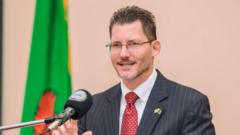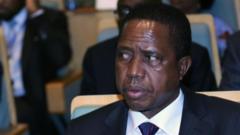The US government has announced a suspension of $50 million in aid to Zambia's health sector following extensive reports of systemic corruption involving the misuse of healthcare donations.
US Suspends $50 Million in Aid to Zambia Amidst Healthcare Corruption Concerns

US Suspends $50 Million in Aid to Zambia Amidst Healthcare Corruption Concerns
US cuts funding due to systematic theft of medical supplies and drugs intended for vulnerable Zambians.
The United States has enacted a significant reduction of $50 million in aid directed towards Zambia's healthcare system, stemming from ongoing issues with the "systematic theft" of essential medicines and medical supplies. Michael Gonzales, the US ambassador to Zambia, described the decision as a necessary yet challenging step, especially in light of the country's shortcomings in safeguarding crucial medical resources.
Despite previous warnings given to the Zambian government regarding the urgent need to protect donated healthcare supplies meant for the nation’s most vulnerable populations, the issue has persisted. "We can no longer support the personal enrichment of fraudsters at the expense of patient care," remarked Gonzales, noting that this action would impact supplies crucial for treating diseases like malaria, HIV, and tuberculosis.
The Zambian health sector has received substantial funding from international donors, ultimately relying heavily on external support. However, investigations have revealed troubling patterns of corruption and mismanagement at high levels within the health sector. Reports indicate that over the span of a year, US embassy teams uncovered that approximately 2,000 pharmacies were found selling drugs that had been donated for free. Alarmingly, 95 percent of these pharmacies were associated with selling stolen medical products, according to findings released by the embassy.
The US embassy representatives expressed their frustration over the Zambian government's inaction despite their offer of expertise to tackle the crisis back in April of the previous year. They emphasized that law enforcement’s focus has primarily been on minor offenders, neglecting to pursue those orchestrating these extensive thefts.
In December, Gonzales stated, “We can no longer justify keeping this level of assistance ongoing,” reinforcing the implications of this aid suspension on both the American taxpayer and Zambian patients. The decision, effective January next year, aims to provide Zambia some time to devise independent strategies for procuring medicines, with Gonzales highlighting the emotional toll of this decision on both American donors and Zambian patients.
Since the beginning of the Trump administration, many global health programs have faced cuts, significantly impacting African nations like Zambia, which continues to battle high HIV rates, particularly among adolescents. Previous remarks by Zambian President Hakainde Hichilema illustrated the detrimental impacts of the aid freeze, as he called for strengthening the country’s treasury to become self-sufficient in medical procurement.
This important story highlights the ongoing struggles faced by Zambia in ensuring healthcare for its citizens while revealing the wider challenges of corruption and accountability in global aid systems.
Despite previous warnings given to the Zambian government regarding the urgent need to protect donated healthcare supplies meant for the nation’s most vulnerable populations, the issue has persisted. "We can no longer support the personal enrichment of fraudsters at the expense of patient care," remarked Gonzales, noting that this action would impact supplies crucial for treating diseases like malaria, HIV, and tuberculosis.
The Zambian health sector has received substantial funding from international donors, ultimately relying heavily on external support. However, investigations have revealed troubling patterns of corruption and mismanagement at high levels within the health sector. Reports indicate that over the span of a year, US embassy teams uncovered that approximately 2,000 pharmacies were found selling drugs that had been donated for free. Alarmingly, 95 percent of these pharmacies were associated with selling stolen medical products, according to findings released by the embassy.
The US embassy representatives expressed their frustration over the Zambian government's inaction despite their offer of expertise to tackle the crisis back in April of the previous year. They emphasized that law enforcement’s focus has primarily been on minor offenders, neglecting to pursue those orchestrating these extensive thefts.
In December, Gonzales stated, “We can no longer justify keeping this level of assistance ongoing,” reinforcing the implications of this aid suspension on both the American taxpayer and Zambian patients. The decision, effective January next year, aims to provide Zambia some time to devise independent strategies for procuring medicines, with Gonzales highlighting the emotional toll of this decision on both American donors and Zambian patients.
Since the beginning of the Trump administration, many global health programs have faced cuts, significantly impacting African nations like Zambia, which continues to battle high HIV rates, particularly among adolescents. Previous remarks by Zambian President Hakainde Hichilema illustrated the detrimental impacts of the aid freeze, as he called for strengthening the country’s treasury to become self-sufficient in medical procurement.
This important story highlights the ongoing struggles faced by Zambia in ensuring healthcare for its citizens while revealing the wider challenges of corruption and accountability in global aid systems.





















